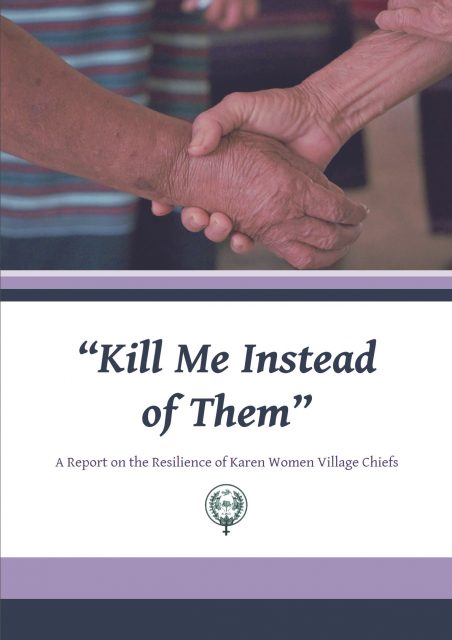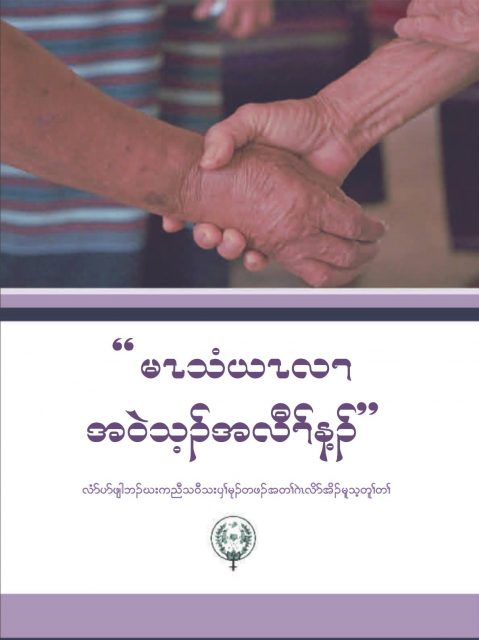“Kill Me Instead of Them” A Report on the Resilience of Karen Women village Chiefs



Executive Summary
This report is based on the testimony of 109 Karen women village chiefs who served during the decades of heavy fighting before the 2012 ceasefi re between the Karen National Union and the Burmese government. It describes their courage and strength in their leadership roles, despite the many different types of human rights violations they experienced.
Abuses suffered by the women village chiefs included the extrajudicial killing of friends, family, and relatives at the hands of the Burma Army. Some shared that they had been porters (forced to carry military supplies day and night by the Burma Army) and others had been subject to torture. During these diffi cult times, their situations were made worse when the military deprived them of food and water and a lack of access to clean facilities to wash and clean themselves. Across this report, women showed courage, determination, empathy, and bravery.
During their time as village chiefs, their lives were always at risk. They were also often captured and detained as a fear-mongering tactic. Many of the survivors were used as human shields when the Burma Army was attacking the bases of opposition forces. Additional violations included being forced to walk ahead of the troops in case of landmines and to guard the roads day and night. The women chiefs were also publicly humiliated. One woman was tied up, red ants put all over her body, and then ordered to dance or she would be killed.
Psychological distress was felt by all the women leaders, who were tasked with the great responsibility of protecting their villages and communities. Despite this, the women regularly showed remarkable strength in overcoming their fears and making sacrifices to protect and uphold the rights of their communities.
Abuses that were experienced or witnessed by women village chiefs also included:
- Crucifixion
- People burnt alive
- Rape
- Torture
- Arbitrary executions
- Beheading
- Slave labour
In response to the threats and intimidation they faced, Karen women village chiefs regularly demonstrated quick thinking and answers to the Burma Army’s presence and requests. Their intuitive ability to seek solutions to these demands enabled them to establish and secure relationships with different armed groups and villagers. The village chiefs in this report served at least one-year terms, with many taking on much longer terms lasting between 10 to 37 years.
Of the many coping mechanisms women village chiefs adopted to ensure the safety of themselves and their villages, the most common tactics were strong negotiating skills; intelligence and quick thinking; natural management and planning skills; controlled stress and fear management; as well as courage and commitment to their communities. Their consistent steadfastness in situations of great uncertainty attests to their natural strength as community protectors.
In sharing their experiences of trials and triumphs for this report, women village chiefs offered a comforting sense of solidarity and strength to one another. All of the women interviewed expressed hope for the future, for their families and for the new generation of young people to not have to carry the same burdens. They remain optimistic for a free, fair and democratic Burma. Following the ceasefires in 2012 and 2015, men have again become willing to assume the role of the village chief. Communities’ tendency to be more accepting of male leadership has compromised the efforts of women who want to continue to lead, but also want to respect the interests of their community.
As a result, only a few women have continued on as village chiefs. Among the 109 women village chiefs interviewed, only seven continued to hold their positions as village chiefs, and another four had taken on other leadership roles in the community. A few of the women who had served as village chiefs are still acting as a village advisor or providing social services in some capacity.
However, the testimony in this report clearly shows the unique skills of women as leaders and advocates for their communities. It is urgently needed for these skills to be recognized. Barriers to women’s leadership in all levels of governance remain an area of concern to KWO. Through our work, KWO is committed to creating more spaces for women to be leaders while dismantling cultural norms blocking gender equality for all.
While the abuses documented in this report took place over ten years ago, the Burma Army is continuing to commit crimes on a widespread scale – including systematic rape — with impunity. KWO is calling for international pressure, including sanctions, to push for the Burmese government to end military impunity, and for the Burma Army to immediately cease all offensives throughout the country, and withdraw from ethnic areas, so that inclusive political negotiation towards federalism can begin.
၎
င
၎
၎
၎
င
၎
၎

